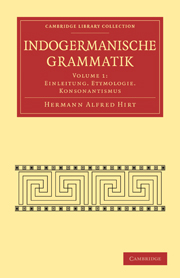Book contents
- Frontmatter
- Vorwort
- Contents
- Literaturangaben
- Verzeichnis der Abkürzungen
- Einleitung
- Erster Teil. Etymologie
- XI. Kapitel Die Lautlehre
- XII. Kapitel Grundgesetze der etymologischen Forschung
- XIII. Kapitel Die Bedeutung der Wörter
- XIV. Kapitel Verwandte und entlehnte Wörter
- XV. Kapitel Verlust von Worten
- XVI. Kapitel Etymologie und Kulturgeschichte
- Zweiter Teil. Der idg. Konsonantismus
- XVII. Kapitel Die Sonorlaute
- XVIII. Kapitel Die Zischlante
- XIX. Kapitel Idg. j und w
- XX. Kapitel Die idg. Tenues und Mediä
- XXI. Kapitel Die idg. Mediä aspiratä
- XXII. Kapitel Die Lautverschiebung
- XXIII. Kapitel Das Hauchdissimilationsgesetz im Griechischen und Indischen
- XXIV. Kapitel Die Gutturalreihen
- XXV. Kapitel Die Tenues aspiratä
- XXVI. Kapitel Sonstige Laute des Idg
- XXVII. Kapitel Konsonantenverbindungen
- XXVIII. Kapitel Die r-Verbindungen
- XXIX. Kapitel Die l-Verbindungen
- XXX. Kapitel Die n-Verbindungen
- XXXI. Kapitel Die m-Verbindungen
- XXXII. Kapitel Die w-Verbindungen
- XXXIII. Kapitel Die j-Verbindungen
- XXXIV. Kapitel Die s-Verbindungen
- XXXV. Kapitel Veränderungen des Konsonantenstandes im Idg. Schwund von Konsonanten
- XXXVI. Kapitel Konsonantenwechsel
- XXXVII. Kapitel Auslautsgesetze
- XXXVIII. Kapitel Der Anlaut
- Autorenverzeichnis
- Sachverzeichnis
- Wörterverzeichnis
XV. Kapitel - Verlust von Worten
Published online by Cambridge University Press: 05 August 2011
- Frontmatter
- Vorwort
- Contents
- Literaturangaben
- Verzeichnis der Abkürzungen
- Einleitung
- Erster Teil. Etymologie
- XI. Kapitel Die Lautlehre
- XII. Kapitel Grundgesetze der etymologischen Forschung
- XIII. Kapitel Die Bedeutung der Wörter
- XIV. Kapitel Verwandte und entlehnte Wörter
- XV. Kapitel Verlust von Worten
- XVI. Kapitel Etymologie und Kulturgeschichte
- Zweiter Teil. Der idg. Konsonantismus
- XVII. Kapitel Die Sonorlaute
- XVIII. Kapitel Die Zischlante
- XIX. Kapitel Idg. j und w
- XX. Kapitel Die idg. Tenues und Mediä
- XXI. Kapitel Die idg. Mediä aspiratä
- XXII. Kapitel Die Lautverschiebung
- XXIII. Kapitel Das Hauchdissimilationsgesetz im Griechischen und Indischen
- XXIV. Kapitel Die Gutturalreihen
- XXV. Kapitel Die Tenues aspiratä
- XXVI. Kapitel Sonstige Laute des Idg
- XXVII. Kapitel Konsonantenverbindungen
- XXVIII. Kapitel Die r-Verbindungen
- XXIX. Kapitel Die l-Verbindungen
- XXX. Kapitel Die n-Verbindungen
- XXXI. Kapitel Die m-Verbindungen
- XXXII. Kapitel Die w-Verbindungen
- XXXIII. Kapitel Die j-Verbindungen
- XXXIV. Kapitel Die s-Verbindungen
- XXXV. Kapitel Veränderungen des Konsonantenstandes im Idg. Schwund von Konsonanten
- XXXVI. Kapitel Konsonantenwechsel
- XXXVII. Kapitel Auslautsgesetze
- XXXVIII. Kapitel Der Anlaut
- Autorenverzeichnis
- Sachverzeichnis
- Wörterverzeichnis
Summary
Allgemeines. Im Laufe der Zeit gehen allenthalben Worte verloren. Zahlreiche lat. Worte sind in den romanischen Sprachen nicht erhalten, viele ahd. nicht im Nhd. Und das ist natürlich auch schon in vorgeschichtlichen Zeiten eingetreten. Daher können wir den idg. Wortschatz ebensowenig vollständig durch die Vergleichung erschließen, wie etwa dem lateinischen aus den romanischen Sprachen. Der wirkliche Wortschatz wird immer umfangreicher gewesen sein als der erschlossene, und zwar beträchtlich umfangreicher. Ich habe Deutsche Et., § 203 ein paar Zusammenstellungen über den Verlust von Worten gemacht, darunter auch solche, die einst im Idg. vorhanden im Altgermanischen in Resten noch vorliegen, jetzt aber völlig verloren sind. Ich gebe hier etwas anderes.
Aus dem Buchstaben a des Lateinischen fehlen an alten Worten im Germanischen: l. abs, gr. ἄψ; l. abies ‘Tanne’; ācer ‘scharf’; acupedius ‘schnellfüβig’; aeger ‘verstimmt, krank’; agnus ‘Lamm’; aio ‘sage’; albus ‘weiβ’; anculus ‘Diener’; animus ‘Seele, Geist’; āra ‘Altar’; arduus ‘hoch, steil’; ariēs ‘Widder, Schafbock’; aser ‘Blut’; āter ‘schwarz’; au- ‘weg’; avis ‘Vogel’.
Förstemann, Gesch. d. d. Sprachstammes 1, 458 ist, soviel ich sehe, der einzige gewesen, der den einschlägigen Stoff zusammengestellt hat. Seine Liste bedürfte freilich der Neubearbeitung, und was dem Germanischen recht ist, sollte den andern Sprachen billig sein.
- Type
- Chapter
- Information
- Indogermanische Grammatik , pp. 178 - 190Publisher: Cambridge University PressPrint publication year: 2009



